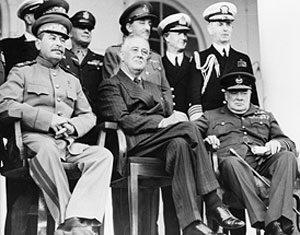In the previous installment, Stalin has proposed before Churchill and Roosevelt at the Teheran Conference in November 1943 that at least 50,000 German “war-criminals” must be executed by firing-squad after the war.
From Freispruch für Deutschland by Heinrich Haertle
Translated by Hadding Scott, 2015
The war’s icy gust suddenly blows through the besottedly peaceful banquet. Churchill blushes deep red. With a jolt his rotund body shoots up; he gasps for breath. Is it his speech-impediment or his brandy-laden tongue that stops him? Then he bellows into the hall: “Such a course of action stands in stark opposition to the British concept of justice!”
As suddenly as he had risen, he slumps back into his chair.
All gazes turn to Stalin. Malevolently he smirks, twirling his black moustache under his heavy nose, then dismisses Churchill with a questioning glance. Was it brandy, acting, or what? The Generalissimo of the Red Army reaches for his vodka-glass, stands stiffly, and again says:
“50,000 must be shot!”
This is a voice that tolerates no contradiction. Churchill hesitates, but raises himself with difficulty and restates, haltingly but calmly:
“The English people will never allow such mass-murder! I quite resolutely reject summarily handing over anyone, Nazi or not, to an execution-squad without a regular, lawful trial.”
His protest seems to be unconvincing. Was this revulsion genuine? The Western intentions for revenge had already been established since the “Third Inter-Allied Conference” of 13 January 1941 in Saint James’ Palace in London. At that time of course one might invoke the Hague Convention, which now, after the war-pact between western democracy and eastern dictatorship, could no longer have jurisdiction. In 1941 it was resolved:
The chief war-aims of the Allies include the punishment of those responsible for these crimes, regardless of whether the particular parties ordered the deeds, committed them themselves, or somehow contributed to them. We are determine to make surea) that the guilty and responsible parties, of whatever nationality they may be, having been discovered, be handed over for judgment and condemned;b) that the pronounced sentences be carried out.
The will for revenge in a guise of legality was even more pointedly expressed on 7 May 1942. That was the occasion of the founding of the “Inter-Allied Commission for War-Crimes,” which was supposed to gather incriminating evidence and to draw up lists of “war-criminals” – consisting only of Germans, of course, not of Italians and Japanese.
Stalin knows about these plans. Just a few days earlier in Moscow, on 1 November 1943, the conference for Allied revenge-justice had been successfully concluded. It ended with the highly promising declaration:
Let those who have hitherto not imbrued their hands with innocent blood beware lest they join the ranks of the guilty, for most assuredly the three Allied powers will pursue them to the uttermost ends of the earth and will deliver them to their accusors in order that justice may be done.
The American Under-Secretary of State Cordell Hull, the British Foreign Minister Eden, and the Soviet Foreign Commissar Molotov determined the text. “The Big Three” signed the document: Roosevelt, Churchill, Stalin.

